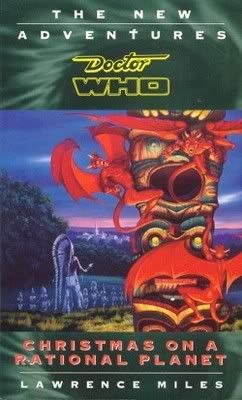 Christmas on a Rational Planet by Lawrence Miles
In Brief: As New York State parties like it's 1799 (which it is) the powers of a cacophonous universe want to replace reality.
Pardon me as I struggle to come to grips with exactly what to say about Christmas on a Rational Planet. The book is audacious, confusing, rather mad and quite quite brilliant. It doesn't so much expand the possibilities of what can be done with the continuing narrative of Doctor Who as much as cut up what has come before, put it in a blender, add some paste and mash together a novel with the result.
First I'll get that pesky thing known as "the plot" out of the way: Roz is trapped in a small town in New York State in 1799, otherwise known as The Age of Reason. As she tries to find The Doctor the Tardis (with Chris inside) is attacked by a force from outside of the universe.
Ok, now that's done we can look at the big picture of what I *think* Miles was getting at. Essentially what he tries here is a total redefinition of The Doctor and indeed the entire past history of the series itself in regards to how much it should fit into any continuing narrative. The main goal is to tear apart the past where The Doctor is the force which "puts right" the problems of the universe. In its place is the view the The Doctor imposes his Reason where he sees fits, as his role as a Watchmaker (aka Time Lord) is to bring order to chaos. However in Christmas on a Rational Planet chaos/cacophony is not a force of evil or destruction but rather the universe as it was in an earlier time, when impossible things ruled before order was forced upon reality. Order and Reason are seen as limiting factors of possibility (such as how slavish attention to the past continuity of Who limits the future).
What Miles does brilliantly is to make the voice of chaos and cacophony ironically reasonable, with a universe of disorder being an appealing proposition. In fact so appealing is this option that the day is "won" not through any defeat of chaos but rather through trickery. Chaos is only banished and will always be looking for cracks into which to place unreasonable things.
The book plays with past continuity in a major way, with minor references being made to practically every televised story in some way. This can range from flash-backs to The Power of the Daleks to the odd re-quote of Professor Zaroff and beyond. Rather than be gratuitous these references serve to reinforce the place of chaos in the Doctor Who universe. Has the show ever *really* had a consistent narrative, and in fact should it even bother? The book's answer is a resolute NO IT DAMN WELL SHOULD NOT!
It acts basically as a big middle finger to those who require that the history of the show make some sort of sense or Reason. Doctor Who has always (and should always) be a series without a "bible", one that is able to change the rules when it sees fit rather than have to adhere to some sort of unbreakable narrative which can never be contradicted.
Unlike some series starting in Star that I could mention. Where else would you end up with antire episodes devoted to the reasons behind a makeup change for the Klingons?
Miles wants to throw out notions of "continuity" and keep the concept of Doctor Who free to do what it wants, and thus having a universe of chaos just next door allows the show to contain a myriad of impossible things.
Now back to the "but is it any good?" part: Yes, Christmas on a Rational Planet breaks completely new ground in what can be done with Doctor Who. It's the first book really since the early days of Timewyrm: Revelation or Transit to completely redefine what we can think of as "Doctor Who story". It's amazing how as this part of the series history begins to close (with only 9 books left to go) once again we see an upswing in quality (echoing the 1988/89 years on TV). Doctor Who always seems to be at its best when up against the wall.
Christmas on a Rational Planet by Lawrence Miles
In Brief: As New York State parties like it's 1799 (which it is) the powers of a cacophonous universe want to replace reality.
Pardon me as I struggle to come to grips with exactly what to say about Christmas on a Rational Planet. The book is audacious, confusing, rather mad and quite quite brilliant. It doesn't so much expand the possibilities of what can be done with the continuing narrative of Doctor Who as much as cut up what has come before, put it in a blender, add some paste and mash together a novel with the result.
First I'll get that pesky thing known as "the plot" out of the way: Roz is trapped in a small town in New York State in 1799, otherwise known as The Age of Reason. As she tries to find The Doctor the Tardis (with Chris inside) is attacked by a force from outside of the universe.
Ok, now that's done we can look at the big picture of what I *think* Miles was getting at. Essentially what he tries here is a total redefinition of The Doctor and indeed the entire past history of the series itself in regards to how much it should fit into any continuing narrative. The main goal is to tear apart the past where The Doctor is the force which "puts right" the problems of the universe. In its place is the view the The Doctor imposes his Reason where he sees fits, as his role as a Watchmaker (aka Time Lord) is to bring order to chaos. However in Christmas on a Rational Planet chaos/cacophony is not a force of evil or destruction but rather the universe as it was in an earlier time, when impossible things ruled before order was forced upon reality. Order and Reason are seen as limiting factors of possibility (such as how slavish attention to the past continuity of Who limits the future).
What Miles does brilliantly is to make the voice of chaos and cacophony ironically reasonable, with a universe of disorder being an appealing proposition. In fact so appealing is this option that the day is "won" not through any defeat of chaos but rather through trickery. Chaos is only banished and will always be looking for cracks into which to place unreasonable things.
The book plays with past continuity in a major way, with minor references being made to practically every televised story in some way. This can range from flash-backs to The Power of the Daleks to the odd re-quote of Professor Zaroff and beyond. Rather than be gratuitous these references serve to reinforce the place of chaos in the Doctor Who universe. Has the show ever *really* had a consistent narrative, and in fact should it even bother? The book's answer is a resolute NO IT DAMN WELL SHOULD NOT!
It acts basically as a big middle finger to those who require that the history of the show make some sort of sense or Reason. Doctor Who has always (and should always) be a series without a "bible", one that is able to change the rules when it sees fit rather than have to adhere to some sort of unbreakable narrative which can never be contradicted.
Unlike some series starting in Star that I could mention. Where else would you end up with antire episodes devoted to the reasons behind a makeup change for the Klingons?
Miles wants to throw out notions of "continuity" and keep the concept of Doctor Who free to do what it wants, and thus having a universe of chaos just next door allows the show to contain a myriad of impossible things.
Now back to the "but is it any good?" part: Yes, Christmas on a Rational Planet breaks completely new ground in what can be done with Doctor Who. It's the first book really since the early days of Timewyrm: Revelation or Transit to completely redefine what we can think of as "Doctor Who story". It's amazing how as this part of the series history begins to close (with only 9 books left to go) once again we see an upswing in quality (echoing the 1988/89 years on TV). Doctor Who always seems to be at its best when up against the wall.
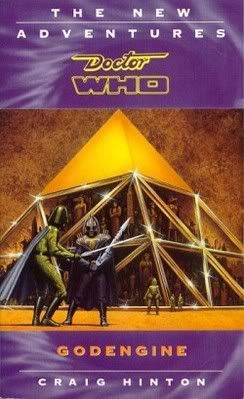 GodEngine by Craig Hinton
In Brief: With the Tardis destroyed (Yeah, right), The Doctor, Roz and Chris are trapped on Mars and must deal with a Deadly Doomsday Weapon of Deadly Doom.
Meanwhile, a group of Ice Warriors work through a love-triangle and other personal problems. A surprise admission of pregnancy is involved.
It was true in reviews from 1996 and it's true now, GodEngine is God-awful. However it's awful in an (almost) amusingly wrong-headed "What was the author *thinking*?!!" sort of way. The biggest problem with the book *isn't* its sub-par prose style, poor plotting or terrible characterisation. IMHO the really big issue, which had me shaking my head bemusedly throughout most of the book, is how Hinton actually manages to write a Doctor Who book which actually isn't a Doctor Who story.
What do I mean by that? I'm loathe to ever say that there is a "right" way to put together a Doctor Who plot since the format of the series is so open format. From a high level a story involving The Doctor & Co. encountering Ice Warriors on Mars and having to stop a big super-weapon should be business-as-usual, if unimaginative. However the problem I had with GodEngine, and it's similar to what I experienced a loooong while back with the horrid Shadowmind, is that the author has decided that they'd rather write a book for a different series and try to shoe-horn it into the Doctor Who lexicon.
Now often this style of genre-melding can work quite well, as great fun is had with landing the Tardis in the middle of a medieval-adventure/space-opera/Agatha Christie-mystery/etc. and watching the result. However the issue with GodEngine is that the book is primarily a Star Trek/Babylon 5 story with a few Doctor Who trappings added.
GodEngine by Craig Hinton
In Brief: With the Tardis destroyed (Yeah, right), The Doctor, Roz and Chris are trapped on Mars and must deal with a Deadly Doomsday Weapon of Deadly Doom.
Meanwhile, a group of Ice Warriors work through a love-triangle and other personal problems. A surprise admission of pregnancy is involved.
It was true in reviews from 1996 and it's true now, GodEngine is God-awful. However it's awful in an (almost) amusingly wrong-headed "What was the author *thinking*?!!" sort of way. The biggest problem with the book *isn't* its sub-par prose style, poor plotting or terrible characterisation. IMHO the really big issue, which had me shaking my head bemusedly throughout most of the book, is how Hinton actually manages to write a Doctor Who book which actually isn't a Doctor Who story.
What do I mean by that? I'm loathe to ever say that there is a "right" way to put together a Doctor Who plot since the format of the series is so open format. From a high level a story involving The Doctor & Co. encountering Ice Warriors on Mars and having to stop a big super-weapon should be business-as-usual, if unimaginative. However the problem I had with GodEngine, and it's similar to what I experienced a loooong while back with the horrid Shadowmind, is that the author has decided that they'd rather write a book for a different series and try to shoe-horn it into the Doctor Who lexicon.
Now often this style of genre-melding can work quite well, as great fun is had with landing the Tardis in the middle of a medieval-adventure/space-opera/Agatha Christie-mystery/etc. and watching the result. However the issue with GodEngine is that the book is primarily a Star Trek/Babylon 5 story with a few Doctor Who trappings added.

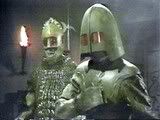
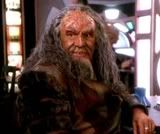 The biggest clue for me was the treatment of the Ice Warriors. In the series proper they're possibly the dullest of the trope of returning monsters we've had over the years. Other than being well designed (for the 60s) they're possibly the most *generic* villain/monster ever to appear in the series. They're really just there to do a bit of "WE WILL CRUSH YOU PUNY HUMAN!" as they invade The Moon/Future Ice-covered England/Peladon. It's telling that they're the only major "classic" monster that has not appeared in the show post-2005, I suspect mainly since there's really nothing interesting that can be done with them.
Although I would love to be proven wrong. *After* the Zarbi are brought back of course.
Yet suddenly Hinton has turned them into pseudo-Klingons/Narns with a "noble and long" history of warfare and honour. While there's nothing wrong with an author wanting to beef up what was before an extremely underwritten group, but in GodEngine it's just far too obvious that Hinton wants to turn them into a Star Trek: TNG/DS9 style of alien race. Complete with love-triangles and big sword-fights o' honour. In this regard I found the book to be one of the most dated of the range as this type of "sci-fi" is *so* very 90s.
With the Ice Warriors brought into the foreground so it means that The Doctor seems to almost disappear for most of the book, only popping up in the narrative now and again to spew some exposition and perform his deus ex machina duties when everything starts blowing up. And while there have been many books in the series where The Doctor is somewhat in the background the other regulars are too underwritten to liven things up. Without Benny to act as the "audience identification character" we're left with Chris & Roz who as characters most authors struggle with at the best of times. Chris in particular hasn't been able to move past his inital character description of being "naive and enthusiastic" and is rather irritating as a result. While Roz has managed a bit more depth she's still at times lumbered with being "New Ace V2.0".
However again I have to remember that this book came out in 1996, when B5 and the various Star Trek series were the big names in anything sci-fi/fantasy. I can understand the temptation to take either of those shows as a template on how to do Doctor Who. With the way that the show had ended on a whimper back in 1989 there was a lot of "what if..." going as as the fan-sphere tried to figure out what, if the show were ever to come back, form it should take. So it makes sense to take what is popular at the time, but also completely wrong. When the show *did* come back in 2005 its success was down to really going back to basics in being "an adventure in time and space" and not be a Farscape/Andromeda/Star Trek clone.
With Benny being gone as a regular we've entered the last phase of the New Adventures, since there are now only 11 books to go before the series ends. Over the next run of books the impact of the Paul McGann TV-movie will be increasingly felt. With the BBC deciding to bring the range "in-house" from Virgin Publishing as well as the obvious need to finally move away from the 7th-Doctor things begin to ramp up towards this phase of the series. This is a case where knowledge of what came later is impacting how I see GodEngine since it's basically the last Old-Monsters run-around in the range.
Even the covers of the books have begun to reflect the coming changes, with the late 80s Doctor Who logo given less emphasis and a notable lack of actually featuring The Doctor on the covers.
Otherwise there's just not much else to say, although I've managed to type quite a lot around a book I didn't really enjoy very much (how *me*). GodEngine is easily one of the weakest entries in the entirety of the New Adventures and harkens back to the big stumbles from the start of the series. I can't even give it an "at least it tried" since too much effort went into turning Doctor Who into a 90s-style Sci-Fi story. This sort of "Let's make Doctor Who more like X!" thinking is thankfully something we've never really got in the show proper (barring the 1996 TV-movie, one of its many sins). If any positive from this book can be found it's that at least it made me appreciate how very good indeed most of the series has been.
The biggest clue for me was the treatment of the Ice Warriors. In the series proper they're possibly the dullest of the trope of returning monsters we've had over the years. Other than being well designed (for the 60s) they're possibly the most *generic* villain/monster ever to appear in the series. They're really just there to do a bit of "WE WILL CRUSH YOU PUNY HUMAN!" as they invade The Moon/Future Ice-covered England/Peladon. It's telling that they're the only major "classic" monster that has not appeared in the show post-2005, I suspect mainly since there's really nothing interesting that can be done with them.
Although I would love to be proven wrong. *After* the Zarbi are brought back of course.
Yet suddenly Hinton has turned them into pseudo-Klingons/Narns with a "noble and long" history of warfare and honour. While there's nothing wrong with an author wanting to beef up what was before an extremely underwritten group, but in GodEngine it's just far too obvious that Hinton wants to turn them into a Star Trek: TNG/DS9 style of alien race. Complete with love-triangles and big sword-fights o' honour. In this regard I found the book to be one of the most dated of the range as this type of "sci-fi" is *so* very 90s.
With the Ice Warriors brought into the foreground so it means that The Doctor seems to almost disappear for most of the book, only popping up in the narrative now and again to spew some exposition and perform his deus ex machina duties when everything starts blowing up. And while there have been many books in the series where The Doctor is somewhat in the background the other regulars are too underwritten to liven things up. Without Benny to act as the "audience identification character" we're left with Chris & Roz who as characters most authors struggle with at the best of times. Chris in particular hasn't been able to move past his inital character description of being "naive and enthusiastic" and is rather irritating as a result. While Roz has managed a bit more depth she's still at times lumbered with being "New Ace V2.0".
However again I have to remember that this book came out in 1996, when B5 and the various Star Trek series were the big names in anything sci-fi/fantasy. I can understand the temptation to take either of those shows as a template on how to do Doctor Who. With the way that the show had ended on a whimper back in 1989 there was a lot of "what if..." going as as the fan-sphere tried to figure out what, if the show were ever to come back, form it should take. So it makes sense to take what is popular at the time, but also completely wrong. When the show *did* come back in 2005 its success was down to really going back to basics in being "an adventure in time and space" and not be a Farscape/Andromeda/Star Trek clone.
With Benny being gone as a regular we've entered the last phase of the New Adventures, since there are now only 11 books to go before the series ends. Over the next run of books the impact of the Paul McGann TV-movie will be increasingly felt. With the BBC deciding to bring the range "in-house" from Virgin Publishing as well as the obvious need to finally move away from the 7th-Doctor things begin to ramp up towards this phase of the series. This is a case where knowledge of what came later is impacting how I see GodEngine since it's basically the last Old-Monsters run-around in the range.
Even the covers of the books have begun to reflect the coming changes, with the late 80s Doctor Who logo given less emphasis and a notable lack of actually featuring The Doctor on the covers.
Otherwise there's just not much else to say, although I've managed to type quite a lot around a book I didn't really enjoy very much (how *me*). GodEngine is easily one of the weakest entries in the entirety of the New Adventures and harkens back to the big stumbles from the start of the series. I can't even give it an "at least it tried" since too much effort went into turning Doctor Who into a 90s-style Sci-Fi story. This sort of "Let's make Doctor Who more like X!" thinking is thankfully something we've never really got in the show proper (barring the 1996 TV-movie, one of its many sins). If any positive from this book can be found it's that at least it made me appreciate how very good indeed most of the series has been.
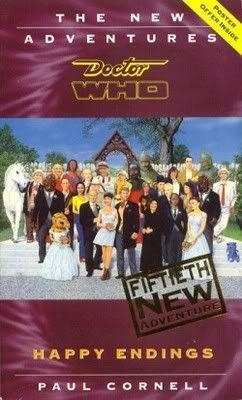 Happy Endings by Paul Cornell
In Brief: It's Benny & Jason's wedding and everyone's invited.
Even The Master.
Happy Endings is one big wedding-cake of a book: Huge, sprawling, over-done, sugary, loud, important and not actually very good. Considering that Paul Cornell has written several of the best entries in the New Adventures (and also No Future) as well as that I remembered really enjoying this "celebration" of the series back when I read it in 1996 I was surprised to find the book trite and irritating this time around. The whole thing really just felt lazy with the book being rather smug and feeling like a massive inside-joke rather than a proper piece of literature.
The plot of the book is purposefully light, which isn't necessarily a bad thing (for instance the similarly "light" The Also People was brilliant) but here has no interesting environment or characters to fill the gap. Most of the book involves the various guests arriving from all of time and space in the village of Cheldon Bonniface (from Cornell's earlier Timewyrm: Revelation) in the far-off year of 2010. There's a reference to almost every other book in the New Adventures, with many characters getting a bit of a coda to their previous adventure. I remembered "back in the day" really liking the rather insane result with sub-plots involving Roz, Chris and Sherlock Holmes meeting up with The Brigadier to thwart a small plot by The Master. Or the camp light-entertainment Silurians.
But this time the whole thing just felt too indulgent. What was also frustration is that a much better book occasionally peeked out, cutting through all of the fluff like a knife. The Brigadier's story involving his facing his death due to illness in old age is beautifully bitter-sweet and gives the book a much needed twinge of sadness to counter-point the festivities. Unfortunately it doesn't last long and ends uncomfortably, with the character given an unlikely extra lease on life.
Overall, perhaps Happy Endings is perhaps too self-conscious, being too meta-textual and self-referential for its own good (although it *was* the mid-90s when irony was king). Or maybe I'm just a miserable sort who can't join along with any sort of fun. But regardless I found a lot of the book somewhat tedious (in particular the large section in the middle that describes in great detail a game of cricket between the village locals and the wedding-guests). Everything just felt too forced, too artificial. Comparable television stories would be the likes of earlier "celebrations" such as The Three Doctors or The Five Doctors which suffered under the weight of being "events" rather than decent stories.
More modern examples include "Journey's End", "The End of Time" or any Steven Moffat-penned episode from 2011.
Doctor Who just doesn't work for me when it spends too much time looking backwards at its own history. Things become too bogged down in silly detail and it just sucks the fun out of everything, which is perhaps the ultimate irony of Happy Endings. But like I said, 15 years ago I clearly recall gobbling this up, loving all of the references to old stories and "getting" the jokes. This time around I needed substance under all of the light-hearted romping.
But at the same time I shouldn't complain too much considering that at least the book tried something different for the series. While my opinion of Happy Endings is no longer what is once was at least the book was never boring (except for the cricket bit that is) and at least kept me reading despite the irritation. And the book does end very well, with Ace (or Dorothee as she's now known) getting a lovely scene with her Mum while Benny & Jason start a new life exploring time and space away from the Tardis (thanks to some time-rings provided by The Doctor).
Happy Endings by Paul Cornell
In Brief: It's Benny & Jason's wedding and everyone's invited.
Even The Master.
Happy Endings is one big wedding-cake of a book: Huge, sprawling, over-done, sugary, loud, important and not actually very good. Considering that Paul Cornell has written several of the best entries in the New Adventures (and also No Future) as well as that I remembered really enjoying this "celebration" of the series back when I read it in 1996 I was surprised to find the book trite and irritating this time around. The whole thing really just felt lazy with the book being rather smug and feeling like a massive inside-joke rather than a proper piece of literature.
The plot of the book is purposefully light, which isn't necessarily a bad thing (for instance the similarly "light" The Also People was brilliant) but here has no interesting environment or characters to fill the gap. Most of the book involves the various guests arriving from all of time and space in the village of Cheldon Bonniface (from Cornell's earlier Timewyrm: Revelation) in the far-off year of 2010. There's a reference to almost every other book in the New Adventures, with many characters getting a bit of a coda to their previous adventure. I remembered "back in the day" really liking the rather insane result with sub-plots involving Roz, Chris and Sherlock Holmes meeting up with The Brigadier to thwart a small plot by The Master. Or the camp light-entertainment Silurians.
But this time the whole thing just felt too indulgent. What was also frustration is that a much better book occasionally peeked out, cutting through all of the fluff like a knife. The Brigadier's story involving his facing his death due to illness in old age is beautifully bitter-sweet and gives the book a much needed twinge of sadness to counter-point the festivities. Unfortunately it doesn't last long and ends uncomfortably, with the character given an unlikely extra lease on life.
Overall, perhaps Happy Endings is perhaps too self-conscious, being too meta-textual and self-referential for its own good (although it *was* the mid-90s when irony was king). Or maybe I'm just a miserable sort who can't join along with any sort of fun. But regardless I found a lot of the book somewhat tedious (in particular the large section in the middle that describes in great detail a game of cricket between the village locals and the wedding-guests). Everything just felt too forced, too artificial. Comparable television stories would be the likes of earlier "celebrations" such as The Three Doctors or The Five Doctors which suffered under the weight of being "events" rather than decent stories.
More modern examples include "Journey's End", "The End of Time" or any Steven Moffat-penned episode from 2011.
Doctor Who just doesn't work for me when it spends too much time looking backwards at its own history. Things become too bogged down in silly detail and it just sucks the fun out of everything, which is perhaps the ultimate irony of Happy Endings. But like I said, 15 years ago I clearly recall gobbling this up, loving all of the references to old stories and "getting" the jokes. This time around I needed substance under all of the light-hearted romping.
But at the same time I shouldn't complain too much considering that at least the book tried something different for the series. While my opinion of Happy Endings is no longer what is once was at least the book was never boring (except for the cricket bit that is) and at least kept me reading despite the irritation. And the book does end very well, with Ace (or Dorothee as she's now known) getting a lovely scene with her Mum while Benny & Jason start a new life exploring time and space away from the Tardis (thanks to some time-rings provided by The Doctor).
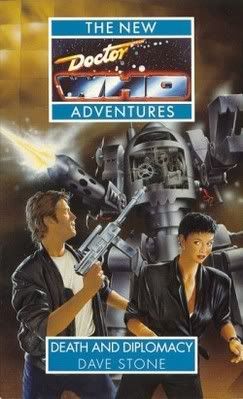 Death and Diplomacy by Dave Stone
In Brief: While The Doctor acts as mediator for a trio of warring factions (and the three-eyed cat creatures who are secretly controlling them) Benny gets engaged. Roz and Chris wander around a bit.
While its entertaining, overall Death and Diplomacy ends up being rather unsatisfying. No part of the book is bad, and in fact much of it is very inventive, but the whole thing just never comes together as it should. It felt like 3 different novellas tenuously linked together without a proper resolution. However, I suspect Stone realised this problem when The Doctor even comments that the resolution was a bit of an anti-climax.
I could comment that this may reflect my feelings towards the latest series on TV, but I've harped on enough concerning my issues with "Series 6".
After the Tardis crew is plucked from the ship and end up in various parts of a distant cluster of stars the plot-strands settle down to being:
1. The Doctor must handle the intrigue of mediation between 3 warring races who all worship mysterious beings known as The Hollow Gods.
2. Bernice finds herself stuck on a rather dilapidated space-ship with Doctor Who's answer to Han Solo, Mr. Jason Kane. Boinking ensues.
3. Chris and Roz wander around and get into various fights and gun-battles.
Then at the end they all meet up and go home. And stuff blows up.
The biggest problem I had with the novel is that there's really not a lot that goes on beyond meandering and a few coincidences too big to really accept. While more tempered than Stone's earlier Sky Pirates! he's still not really gotten the grasp of plotting and pacing. In their place we find Stone's very Douglas Adams-like sense of humour, which while not bad does tend to give the book a *very* 1990s post-modern sentiment. This was definitely a product of the "Scream"/"Buffy"/"Farscape" years of not-so-subtly winking at the audience. While not disastrous by any means it does lend the book a somewhat dated feel compared to the rest of the series and left me not quite caring what was going on.
Another problem was that the character of Jason just doesn't really work for me. He's shallow, manipulative and immature and only the fact that Benny seems to really *really* like having sex with him explains her agreeing to get married at the end of the book. Girl, you can do better.
But I'm making it sound like I found Death and Diplomacy to be a bad book, which I didn't. I think it's just that it's a novel I didn't feel fulfilled its potential. Dave Stone *can* write, he just needed to move away from the too-jokey style which was distracting. So while still a good book with some great ideas I can't help but feel this is the New Adventures equivalent to The Horns of Nimon, a fun time but overall lacking.
Death and Diplomacy by Dave Stone
In Brief: While The Doctor acts as mediator for a trio of warring factions (and the three-eyed cat creatures who are secretly controlling them) Benny gets engaged. Roz and Chris wander around a bit.
While its entertaining, overall Death and Diplomacy ends up being rather unsatisfying. No part of the book is bad, and in fact much of it is very inventive, but the whole thing just never comes together as it should. It felt like 3 different novellas tenuously linked together without a proper resolution. However, I suspect Stone realised this problem when The Doctor even comments that the resolution was a bit of an anti-climax.
I could comment that this may reflect my feelings towards the latest series on TV, but I've harped on enough concerning my issues with "Series 6".
After the Tardis crew is plucked from the ship and end up in various parts of a distant cluster of stars the plot-strands settle down to being:
1. The Doctor must handle the intrigue of mediation between 3 warring races who all worship mysterious beings known as The Hollow Gods.
2. Bernice finds herself stuck on a rather dilapidated space-ship with Doctor Who's answer to Han Solo, Mr. Jason Kane. Boinking ensues.
3. Chris and Roz wander around and get into various fights and gun-battles.
Then at the end they all meet up and go home. And stuff blows up.
The biggest problem I had with the novel is that there's really not a lot that goes on beyond meandering and a few coincidences too big to really accept. While more tempered than Stone's earlier Sky Pirates! he's still not really gotten the grasp of plotting and pacing. In their place we find Stone's very Douglas Adams-like sense of humour, which while not bad does tend to give the book a *very* 1990s post-modern sentiment. This was definitely a product of the "Scream"/"Buffy"/"Farscape" years of not-so-subtly winking at the audience. While not disastrous by any means it does lend the book a somewhat dated feel compared to the rest of the series and left me not quite caring what was going on.
Another problem was that the character of Jason just doesn't really work for me. He's shallow, manipulative and immature and only the fact that Benny seems to really *really* like having sex with him explains her agreeing to get married at the end of the book. Girl, you can do better.
But I'm making it sound like I found Death and Diplomacy to be a bad book, which I didn't. I think it's just that it's a novel I didn't feel fulfilled its potential. Dave Stone *can* write, he just needed to move away from the too-jokey style which was distracting. So while still a good book with some great ideas I can't help but feel this is the New Adventures equivalent to The Horns of Nimon, a fun time but overall lacking.






